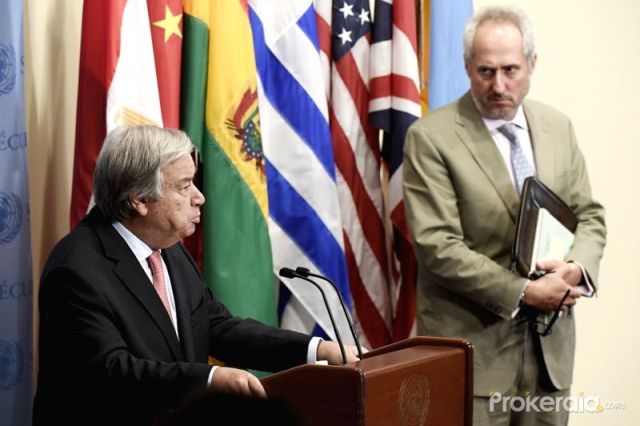
by Editor | May 25, 2021 | World
 By Arul Louis,
By Arul Louis,
United Nations : Secretary-General Antonio Guterres is betting that the battle against climate change will be won through the technological advances and public mobilisation even if governments fail to act.
While “there are reasons to be alarmed” about the rapid pace of climate change, “we believe that the right bet is the bet that technology is pointing to, and that bet is the green technology, and cities, companies, consumers are making that bet,” he said on Monday.
“I think that what is clear is that the reality is changed by the companies that produce, the consumers, the cities that manage,” he said. “Very little depends today, in relation to climate change, on central government.”
“I am very confident that this battle will be won, because the realities of today’s economy are such that the wise decision is the green decision,” he added, while speaking to reporters announcing the re-appointment of Michael Bloomberg, the media tycoon and former New York mayor as his Special Envoy for Climate Action.
“Because of technological advances, the cheapest energy today is green energy,” Guterres said.
Reinforcing it is the “enormous capacity to mobilise the civil society, the business community and the cities” he said. “And we see cities, but also companies and civil society everywhere, leading climate action, leading the capacity of the international community to be able to beat climate change.”
In an apparent warning to US President Donald Trump, who has tried to roll back some of the environmental regulations and programmes for countering climate change, Guterres said without naming him, “Countries that do not back today the green economy will not be leading countries in the global economy of the future.”
Bloomberg said that “without any help whatsoever from the federal government” the US was way ahead in meeting the greenhouse gas reduction goals set for 2025.
“In fact, we have done more than any other industrial country in the world to meet those goals.”
The multi-billionaire is the founder of the financial news and information company that bears his name and he also runs a philanthropy devoted to fighting climate change and issues of immigration, gun control and public health.
He was first appointed the Secretary-General’s Special Envoy for Climate Action by Guterres’s predecessor Ban Ki-moon in 2015.
“Because of public pressure and the low price of natural gas, 268 of about 500 coal-fired electricity plants in the US have closed or are in the process of closing,” Bloomberg said.
“Corporations today are very, very sensitive to their responsibilities to be environment friendly,” Bloomberg said.
“When a big money manager goes to visit a corporation to check on their earnings, the first question that comes in this day and age is, ‘What are you doing to fight climate change?'” he said. This is because the pension funds, endowments and other investors want their money to be invested responsibly, he explained.
As for Trump, he said he hoped that the president “listens to his advisers and looks at the data and changes his mind.”
“And if that is the case, that shows a great leader, who, when facts change, they recognise something different, they are not bound to what they did before, they are willing to change,” he said. “And I think it is fair to say that this president does change his view, generally from one day to the next, but over a longer period of time, hopefully he will.”
(Arul Louis can be reached at arul.l@ians.in)
—IANS

by Editor | May 25, 2021 | Employment, Overseas, World

FAO Director General Jose Graziano da Silva
Khartoum : Africa must, in coming decades, explore the entire food chain to create adequate jobs for young people, especially in rural areas, the head of the United Nations Food and Agriculture Organisation said on Thursday.
“Countries need to promote a rural and structural transformation that fosters synergies between farm and non-farm activities and that reinforces the linkages between rural areas and cities,” said FAO Director General Jose Graziano da Silva.
This includes processing, packaging, transportation, distribution, marketing and service provision, especially financial and business services, he said at FAO’s Regional Conference for Africa centered on the theme of creating decent and attractive jobs in the continent – the world’s youngest in terms of the average age of its population.
Estimates suggest that up to 12 million new jobs will have to be created every year to absorb new labour market entrants over the next 20 years, FAO said.
Today some 54 percent of Africa’s workforce – especially farming families – rely on agriculture for their livelihoods, income and employment, the UN agency said.
With more people moving to cities, demand on urban food markets will grow, which in turn can generate job opportunities in all agriculture-related activities, but more must be done to create non-agricultural employment in rural areas, including agro-tourism and other services, FAO believes.
“More than ever, strategic partnerships are needed to bring together the African Union, the African Development Bank and the UN system and other development partners,” Graziano da Silva said.
He pointed to FAO’s regional programme, “Youth Employment: enabling decent agriculture and agri-business jobs”, which goes beyond farm jobs and seeks to develop capacity and scale up successful approaches through programme formulation and partnerships.
But FAO urged measures to help smallholders and farming families as more profitable urban markets can concentrate food production in large commercial farms, with large processors and retailers dominating the value chain (products or services sold to consumers).
“Smallholders and family farmers need specific policies and regulations. This includes providing access to inputs, credit and technology and improving land tenure,” Graziano da Silva said.
Social protection programmes, including cash transfers can play a crucial role by linking public food purchases to family farmers’ production, he noted.
—IANS

by Editor | May 25, 2021 | Muslim World
 United Nations : The UN special coordinator for the Middle East peace process, Nikolay Mladenov, on Tuesday warned that tensions in the Middle East are taking “an increasingly perilous turn.”
United Nations : The UN special coordinator for the Middle East peace process, Nikolay Mladenov, on Tuesday warned that tensions in the Middle East are taking “an increasingly perilous turn.”
“Fighting in Syria is increasing, endangering de-escalation arrangements and regional stability, as well as undermining efforts for a political solution.
“Despite the positive news from Iraq and the defeat of the Islamic State terrorist group, much of the Middle East continues to be in the grips of an ongoing human tragedy of immense proportions,” Xinhua quoted Mladenov as saying to the Security Council.
Against this backdrop and after over a century of hostilities including 50 years of continued military occupation, Israelis and Palestinians are still no closer to peace. Many have lost hope that they will see it in their lifetimes, he said.
“The enemies of peace are growing more confident by the day. They see every failure of the forces of moderation as a win for the forces of radicalisation. They believe the political odds are turning in their favor. Day after day they are emboldened.”
Hindering peace are also those who push facts on the ground, who promote unilateral moves blocking the pathway back to the negotiating table, warned Mladenov.
“None of this will bring us closer to resolving the conflict. None of it will respond to the inalienable right of the Palestinian people to statehood or the Israeli longing for security. It will only drive us further down the road of confrontation, suffering and a one-state reality of perpetual occupation.”
The security situation on the Golan Hights is also a matter of growing concern, said Mladenov.
A worrying escalation occurred on Feb 10, when Israeli Defence Forces destroyed what they identified as an Iranian unmanned aerial vehicle which had reportedly entered its airspace from Syria.
Shortly thereafter, Israeli aircraft targeted a Syrian airbase. During the attack, one Israeli jet was hit, injuring two pilots, which further prompted Israel to attack what it described as “12 military objectives” inside Syria.
“I urge all sides to work toward easing tensions in this highly volatile area,” he said.
Heightened rhetoric was exchanged between Israel and Lebanon over disputed maritime areas, he said. The UN continues to call on the sides to act responsibly, avoid security risks and explore with the support of the United Nations ways to resolve the issue, he said.
Preparations continue for May parliamentary elections in Lebanon and for the upcoming Rome II and Cedre conferences to support the security sector and economy, respectively due on March 15 and April 5, said the UN envoy.
—IANS

by Editor | May 25, 2021 | Muslim World

Stephane Dujarric (Right)
By Arul Louis,
United Nations : The UN will be making contacts with Maldives leaders in response to the request by the opposition leaders for Secretary-General Antonio Guterres to oversee the all-party talks proposed by that nation’s President Abdulla Yameen, Guterres’s Spokesperson Stephane Dujarric said on Friday.
“We are very aware of the request,” he told reporters when asked about the opposition’s letter to Guterres. “Contacts will be made in the next few days.”
Taking up the Secretary-General on his offer to have the UN facilitate all-party talks, the Joint Opposition wrote to Guterres asking for the mediation between them and the government of President Abdulla Yameen.
Earlier this month Guterres, who called for restoration of democracy on the Indian Ocian nation, reiterated “his belief in finding a solution to the political stalemate in the Maldives through all-party talks, which the United Nations continues to stand ready to facilitate,” according to Dujarric.
In the letter to Guterres, the Joint Opposition led by former President Mohamed Nasheed’s Maldivian Democratic Party welcomed the government’s offer of a dialogue in principle, but expressed concern that it was a ploy to ease international condemnation over its recent actions, according to the Colombo Gazette.
The opposition asked Guterres to urge the Maldives government to create an acceptable environment for dialogue.
The Gazette reported that according to the opposition, for this to happen the government must fully implement the Supreme Court ruling of February 1, and release Chief Justice Abdulla Saeed, Supreme Court Justice Ali Hameed and other political prisoners and withdraw the military from Parliament allowing it to function fully.
The crackdown began when the Supreme Court unanimously overturned the terrorism conviction of Nasheed as well as the convictions of eight other politicians on several charges.
Yameen clamped down a state of emergency and arrested the judges along with several politicians.
The other three judges left on the Supreme Court overturned their unanimous ruling ordering the release of the nine politicians.
(Arul Louis can be reached at arul.l@ians.in)
—IANS

by Editor | May 25, 2021 | Commodity Market, Corporate, Corporate finance, Corporate Governance, Economy, Finance, Investing, News, Politics

For representational purpose only (Google image)
Rome : The UN International Fund for Agricultural Development (IFAD) and the Indian government signed a $168 million pact to sustainably raise incomes and food security for tribal farming households in northeast India, IFAD reported.
The six-year project will help 201,500 rural highland farming households in tribal villages in 12 districts located in the uplands of Mizoram and Nagaland States, IFAD said.
The target population is smallholder farmers who depend on rain-fed agriculture and a shifting cultivation system known as ‘jhum’ for their livelihoods, IFAD stated.
“Once sustainable, the jhum-based upland farming system is breaking down due to low productivity, shortening and shifting cultivation cycles with less time to restore soil fertility and biodiversity, and an increasing demand for food by a growing population,” said Meera Mishra, the IFAD country coordinator for India.
“Changing climate patterns are also having a negative effect,” Mishra added.
The project will systematically align traditional jhum practices to the natural regeneration cycle of forests while encourage jhum farming households to adopt alternative farming systems, such as sedentary farming, wet-terrace rice fields and improved livestock systems, said IFAD.
The aim is to promote climate-resilient, remunerative and environmentally sustainable agricultural practices that reduce pressure on natural resources, according to IFAD.
The project includes a $75.5 million loan and a $1 million grant from IFAD and will be co-financed by the governments of Mizoram and Nagaland.
The agreement was inked by Gilbert F. Houngbo, President of IFAD, and Anurag Agarwal, Joint Secretary in the Indian Department of Economic Affairs, IFAD stated.
IFAD said it had financed 29 rural development programmes and projects in India since 1979, investing $1.12 billion to benefit almost 4.8 million rural households.
—IANS/AKI





